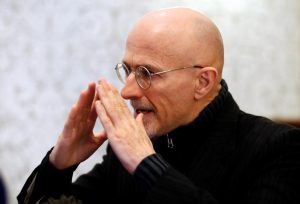Nov 17 2017
The Ethics of Head Transplants
 Newsweek, who has been following the story of Italian Neurosurgeon, Sergio Canavero, now reports: “Human Head Transplants Are About to Happen in China: But Where Are the Bodies Coming From?”
Newsweek, who has been following the story of Italian Neurosurgeon, Sergio Canavero, now reports: “Human Head Transplants Are About to Happen in China: But Where Are the Bodies Coming From?”
I have already discussed the scientific aspects of this claim. They are highly implausible and I doubt that such a transplant is about to happen at all. If it does I predict it will be a dismal failure, and ethically dubious. First, I have to reiterate, that it is far more accurate to call such a procedure a body transplant. The head donor will wake up with a new body. The body donor is, I suspect, dead.
There are three basic hurdles that need to be overcome in order to have a successful body transplant – the surgical attachment, suppression of rejection, and regeneration of the attached neurological tissue. Given that Canavero is a surgeon, I suspect he is excited about the first issue. He may think he has made some advances because he improved his technique for making the attachment. This was never, however, the primary hurdle.
We are already making great advances with organ transplantation and controlling rejection. However, this is still a huge issue. Donor and recipient have to be closely matched, and lifelong drugs are required. Still, the amount of tissue being transplanted here will be a challenge. It opens up, for the first time, the possible effects of tissue rejection on an entire brain. While this is a significant hurdle, our current treatments mean it is not necessarily a deal breaker (it might be, but research would be needed to see).
The real deal breaker here is the third issue – getting the neurological tissue to regenerate, specifically the spinal cord and various nerves. If you cannot get the head and body to communicate through the spinal cord, you will be essentially creating a quadraplegic – the body recipient will be entirely paralyzed and need to be on a ventilator.
Canavero is claiming that he has farmed out this research to another team, who have made such progress that he can proceed with a transplant. To say I find that hard to believe is an understatement. Such an advance would be truly enormous. There are research teams around the world working on spinal cord regeneration with modest progress – so how has Canavero’s mystery team left them all in the dust, without leaving a paper trail behind in the published literature?
Further, if Canavero’s team has solved the spinal cord regeneration problem (they haven’t, but just hypothetically) using that technology for a body transplant would be ridiculous. How about using it to help the half a million people who suffer a spinal cord injury each year? So either they are lying, or they are holding out such a technology, with is ethically monstrous.
Why China?
Canavero was unable to continue with his research in Italy, so now has moved to China where he claims to have the support of the Chinese government, and further claims he plans to proceed with the first “head transplant” next month. But why China? Newsweek speculates:
It is our suspicion that the authorities in China supporting this procedure are doing so wagering that a successful transplant will demonstrate to the world the dazzling level of technological achievement in the country. Perhaps it will. At a minimum, this procedure reveals that Chinese authorities believe there is no cost too high for raising China’s profile on the world stage.
But it also reveals something else that we think is important: cultural values determine what kinds of scientific research happens and where it happens.
If true, I predict their gamble will backfire. They are essentially backing a crank with impossible claims, and doing so does not make them look like they have advanced technology. Rather, it makes them look gullible and backward. They may think it’s worth the gamble, however. If it fails, that failure will mainly be ignored or discussed on the fringe. If it succeeds, they will stun the world. They will also likely distance themselves from any failure, but fully embrace any success.
Newsweek also brings up another issue. Where are the bodies coming from? China does not have a specific definition of death, and is not in line with the Western world on this issue. This is critical for organ donation. A donor needs to be officially dead, and proper consent had to have been given, either by the donor prior to death, or by their family.
Overall China does not have a great reputation for medical ethics and regulation. This is why they are a major center for fraudulent stem cell clinics, for example. There is potentially much overlap here. Chinese stem cell clinics, selling dubious treatments without proper published evidence to back them up, and without proper transparency, are presented by China as evidence that they are on the cutting edge. In reality they exist to lure desperate Westerners in for fake treatments costing tens of thousands of dollars. Perhaps China is looking to expand into the body transplant market.
In fact China is becoming a center for high tech medical quackery, which makes them a perfect fit for Canavero. I suspect this will play out like other dubious claims of technological advancement (like free energy) – delay, excuse, unsubstantiated claims of success, followed by evasion, then further excuses. Along the way someone will be conned out of money somewhere.
Update: Canavero claims he has transplanted the head from one corpse to another. This, of course, changes nothing I discussed above.






